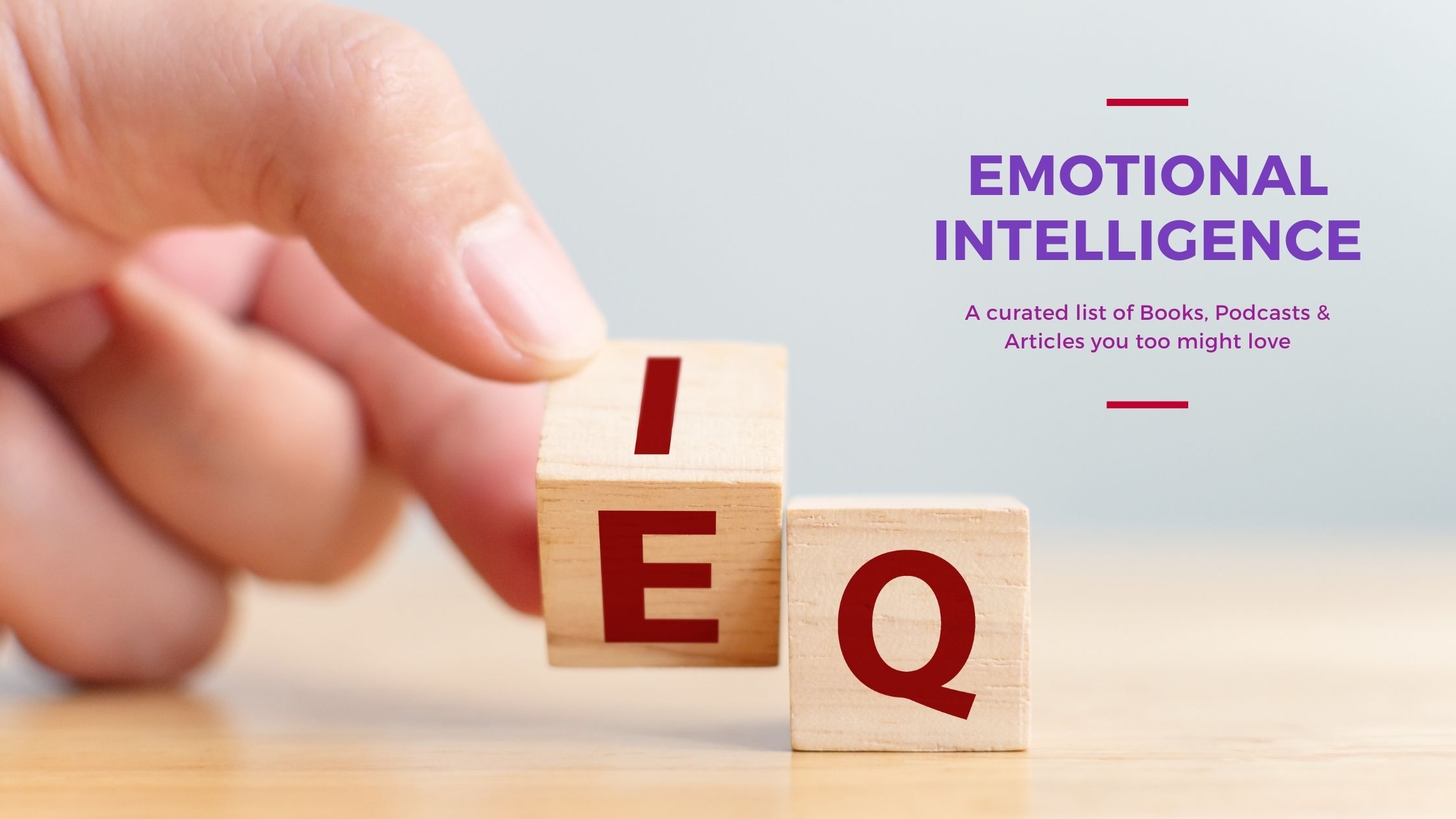Hello Friends!
As we oh-so-slowly creep towards the finish line of this global pandemic, it is starting to feel like Emotional Intelligence is a bit in short supply. Finding the energy, the self-awareness, and the compassion to manage our emotions in positive ways, to relieve stress, to communicate effectively, and to empathize with others has been a bit challenging recently, don’t you find?
Which is probably why these podcasts, books, and articles caught my interest over the last few weeks! And why I am sharing them with you. 🙂
Some insight, some motivation, and some expansion to our EQ toolkit is the theme of this week’s newsletter.
PODCASTS
Daniel Goleman is THE expert on Emotional Intelligence and wrote the seminal work on the topic in 1995. He was interviewed recently on the Armchair Expert podcast, and I find this style of conversational interview makes the information so accessible. If you’ve not had a chance to hear Goleman discuss Emotional Intelligence and what it actually looks like in practical terms, this is a great intro to the topic.
I love getting introduced to new podcasts, and thanks to a wonderful Executive Coaching workshop a few weeks ago, I discovered the Feel Better Live More podcast. The episodes are quite long – most clock in at more than 1h30 – which I expected to be off-putting, but instead found that I really enjoyed the depth of the interviews. I really liked the episode on “Why emotions matter more than you think” with Professor Marc Beckett. My favourite piece was the concept of asking yourself “Are you an emotional scientist? Or an emotional judge?” Similar to my take-away from the Ted Lasso series I recommended recently (“Be curious, not judgemental”), I love the idea of thinking about our forays into the field of EQ as scientific enquiry, with the experimentation and trying of new things that that entails. Beckett is – as I am! – a proponent of the power of naming our emotions, saying you need to “name it to tame it”. His theory that “a lot of ‘lifestyle issues‘ are a downstream consequence of a lack of emotional intelligence” was also very well laid-out and discussed. A fascinating listen!
ARTICLES
If you’re wondering what Emotional Intelligence looks like in the wild, then this article is really enlightening! It’s the 19 Things Emotionally Intelligent People Do. It might seem self-evident, but #1 is that they actually think about feelings, something apparently not everyone actually does! 😉 It’s a really brilliant list of the attributes that emotionally intelligent people possess. A great tool for a bit of self-evaluation!
Two articles on specific facets of Emotional Intelligence I found interesting and informative:
Why We Need Praise – an insightful article written by a friend and fellow coach, I found this line particularly hit the mark: “the praise we want the most – and therefore miss the most when it’s absent – is the praise that reflects what we most want to confirm about ourselves, or the areas where we have the greatest insecurities.” This definitely rings a bell for me. You too?
I love a good acronym, and think FOPO is just brilliant! FOPO stands for the Fear of Other People’s Opinions. Something almost all of us suffer from at some point in our lives. In this HBR article about How to Stop Worrying About What Other People Think of You, you get some strategies for both dealing with FOPO and for conquering it. Developing a personal philosophy – finding your why and identifying your core values – is the key piece of advice. Something that is also at the core of coaching!
EMOTIONAL INTELLIGENCE THROUGH FICTION
So many people have recommended “Hamnet” to me recently that I just had to read it. [It is titled “Hamnet & Judith” in North America.]
I was first introduced to Maggie O’Farrell’s writing when my book club read “The Vanishing Act of Esme Lennox” – a haunting and disturbing story of a woman unrightfully locked away in a sanatorium. It doesn’t sound at all interesting but it was brilliantly written and really stayed with me. Very much worth a read!
So I was keen to read Hamnet as I’d enjoyed the other books of O’Farrell’s I had read. This one really does fit nicely into the theme of emotional intelligence, as it is written from the point of view of the internal thoughts of most of the main characters. There is very little dialogue. The story revolves around William Shakespeare’s family and is based upon the true events of his early years as a novelist. Shakespeare had 3 children, including twins Hamnet & Judith. Hamnet died at age 11, and a few years later, Shakespeare wrote Hamlet, the play for which he is most famed. The novel is almost exclusively the thought processes of the family as Shakespeare meets his wife, marries, starts a family, moves to London to become a writer, and then as both twins are struck by the plague.
The book is written so lyrically and poetically that it does true justice to Shakespeare himself. A beautiful, if slightly melancholy, novel.
This week I took part in my first-ever live interview! As part of International Coaching Week, I was interviewed by my incredible coach trainer, Gillian McMichael, about my journey of building up a successful executive coaching practice. It was a lot of fun, and a real honour to work with Gillian. If you’d like to hear more about my journey, the interview can be found here and here.
I can barely believe it, but I am actually taking next week off!! I’ve got a week of cycling, swimming, and running planned – my idea of a dream holiday!! 🙂 While there won’t be any triathlon season again this year, this triathlete still wants to get out there and have some fun! Can’t wait to recharge my batteries! #IamSolarPowered! 😉
Have a wonderful weekend! And for those in Bavaria, enjoy the Pentecost holiday!
Stay healthy!
Hugs,



